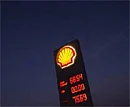
The oil giant's top executive in Nigeria, Ann Pickard, told U.S. diplomats in Abuja in October 2009 that Shell had obtained secret information, including a letter showing Nigeria had invited bids for oil concessions from China.
"She said the GON (government of Nigeria) had forgotten that Shell had seconded people to all the relevant ministries and that Shell consequently had access to everything that was being done in those ministries," U.S. Ambassador Robin Renee Sanders was quoted by the Guardian as saying in a cable to Washington.
Nigeria is Africa's top oil exporter, and its energy industry has been dominated for decades by international oil firms such as Exxon Mobil, Total and Shell.
But oil production has been plagued by years of attacks on vulnerable pipelines and platforms by militant groups in the Niger Delta, which increased in intensity from mid-2006 until an amnesty last year brought a halt to sabotage attacks.
The Guardian said Pickard, according to a September 2008 cable from the U.S. consulate in Lagos, had sought to share intelligence with the U.S. government on militant activity, which at its peak shut down a quarter of Nigeria's oil output.
"She claimed Shell has 'intelligence' that one to three surface-to-air missiles (SAMs) may have been shipped to Nigerian militant groups, although she seemed somewhat sceptical of that information and wondered if such sensitive systems would last long in the harsh environment of the Niger Delta."
Ironically, the Shell executive expressed wariness about discussing sensitive issues with U.S. officials.
"Picard has repeatedly told us she does not like to talk to U.S. government (USG) officials because the USG is 'leaky'," the leaked memo said.
No one at Royal Dutch Shell was available for comment early on Thursday.
